In the face of unexpected emergencies, having a well-equipped 72-hour emergency backpack can be a literal lifeline. These kits are designed to provide individuals and families with the necessary essentials to sustain themselves for up to 72 hours in the event of a disaster or evacuation.

We will explore the key components and considerations for assembling a comprehensive 72-hour emergency kit that can help ensure your safety and well-being during challenging times.
Make sure that every family member has their own backpack and check them every six months or so to change out clothing or personal needs.
For families with young children I would recommend the parents have larger backpacks filled with the basic supplies needed and then each child have their backpacks with snacks, water, personal items such as clothes, diapers etc.
Make sure your child can carry the backpack.
The Basics of a 72 Hour Backpack:
Here is a printable list of ideas for your 72 hour backpack kit. You can grab an old backpack and fill the items yourself or grab a backpack like this one and then add any personalized items to it as needed.
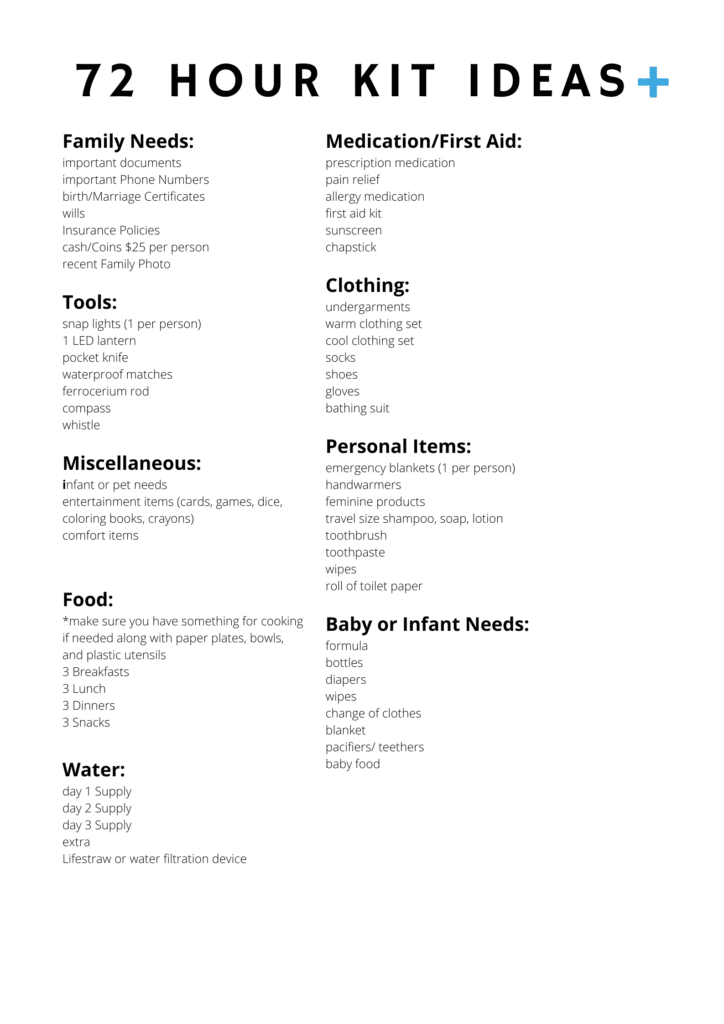
Water and Hydration:
Water is the most critical component of any emergency kit. Include at least one gallon of water per person per day to cover drinking and sanitation needs. Consider compact water purification tablets or filters for additional water sources.
In each of our 72 hour backpacks we have a lifeststraw for water filtration along with water bottles.
Nutrition:
In each backpack pack non-perishable, high-energy food items. Include items such as energy bars, beef jerky and dehydrated meals. Ensure that the food is easy to prepare or ready to eat without the need for cooking. I would avoid canned foods unless you are going to include a can opener in your backpack.
Make sure you pack items that have at least a one year shelf life.
Shelter and Warmth:
Pack a compact, weather-resistant emergency tent or a reflective emergency blanket to provide shelter from the elements. This only needs to be packed in one backpack for families with children.
Include extra layers of clothing in each backpack, including a waterproof jacket, to stay warm in various conditions. Consider where you live and what types of clothing you will need. Also consider hand warmers, socks, gloves, a pair of water resistant shoes and a hat or beanie. Include a bandana which can be used for multiple uses (face covering, tourniquet, tissue).
First Aid Kit:
A well-stocked first aid kit is crucial for addressing minor injuries and illnesses. Include bandages, antiseptic wipes, pain relievers, and any necessary prescription medications.If you need extra prescription medication consider Jase Medical. Click this link and you can use code: JAM-1792 at checkout to get $10 off.
Consider having medications for all ages like children’s Motrin or Tylenol.
Lighting and Communication:
Include a reliable flashlight with spare batteries, a portable radio for emergency broadcasts, and a whistle for signaling. A multi-tool or a Swiss Army knife can also be handy for various tasks.
Special Considerations:
Personal Hygiene Items:
Include travel-sized toiletries such as toothpaste, toothbrush, hand sanitizer, and personal hygiene products. Consider the unique needs of each family member, including infants or elderly relatives.
Important Documents:
Keep photocopies of essential documents in a waterproof pouch, including identification, insurance policies, medical records, and emergency contact information. USB drives with digital copies can be a valuable addition.
Cash and Coins:
In case of power outages or electronic payment failures, having some cash in small denominations can be crucial. Include coins for payphones or vending machines.
Multi-use Tools:
Pack versatile tools such as a multipurpose knife, rope, duct tape, and a small sewing kit. These items can prove invaluable for making temporary repairs or improvising solutions.
Entertainment and Comfort:
Consider including items such as a deck of cards, a small book, or a favorite snack for comfort. Keeping morale high during stressful times is essential for mental well-being.
72 Hour Backpack Ideas For Adults:
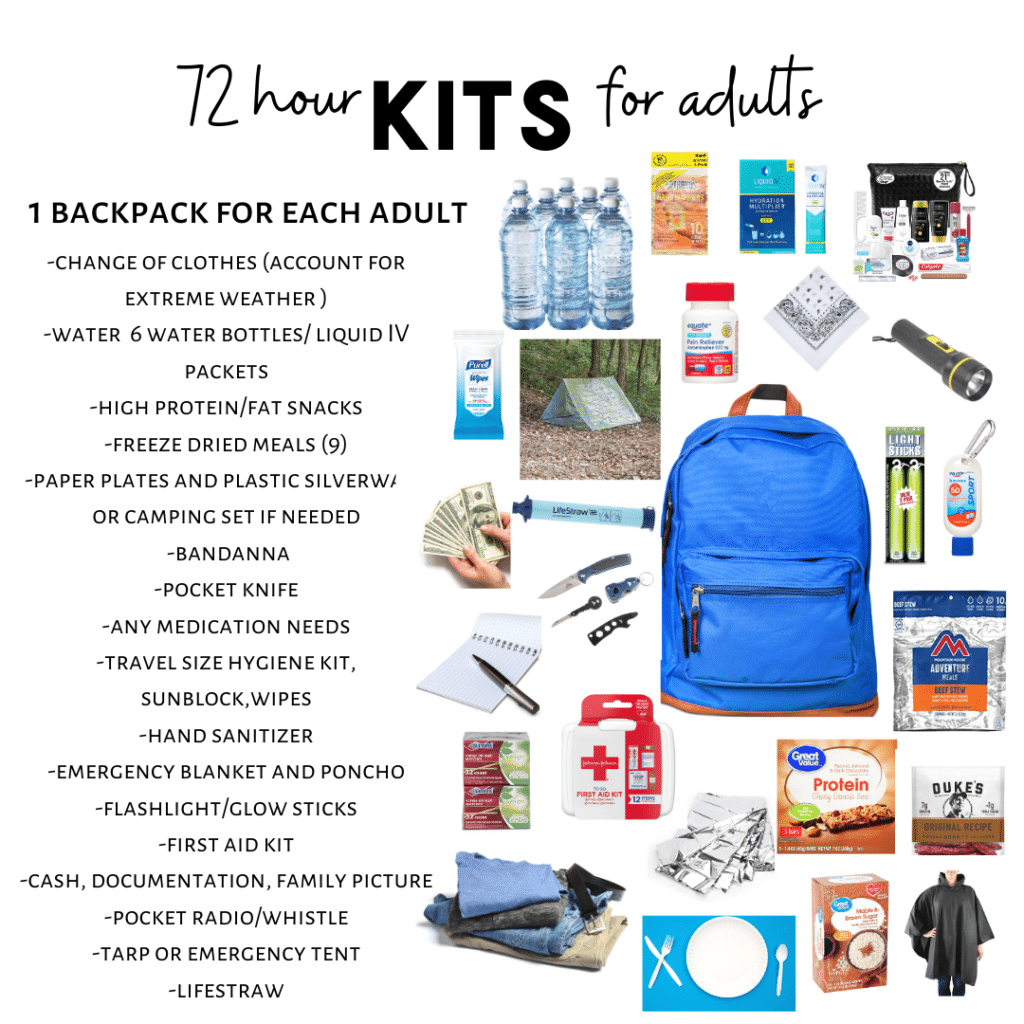
72 Hour Backpack Ideas For Kids:
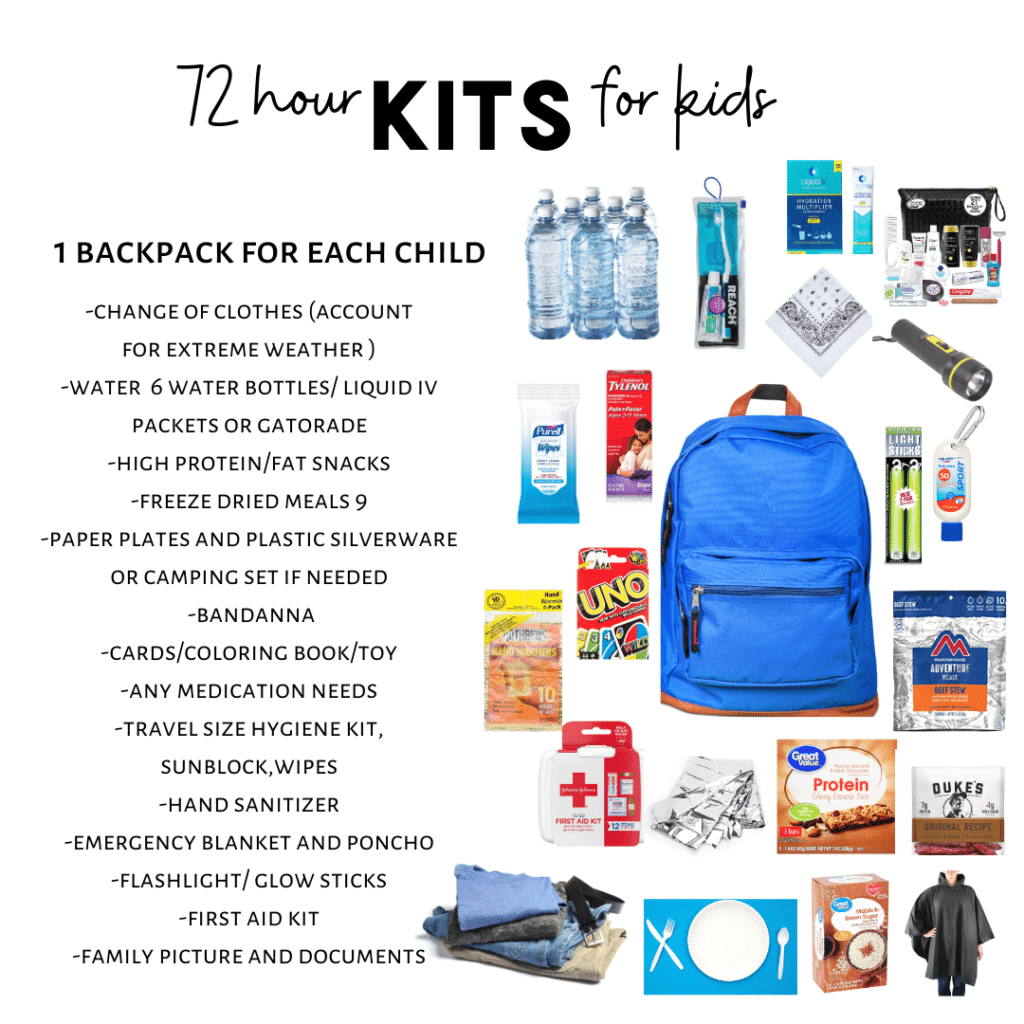
72 Hour Backpack Ideas For Babies:
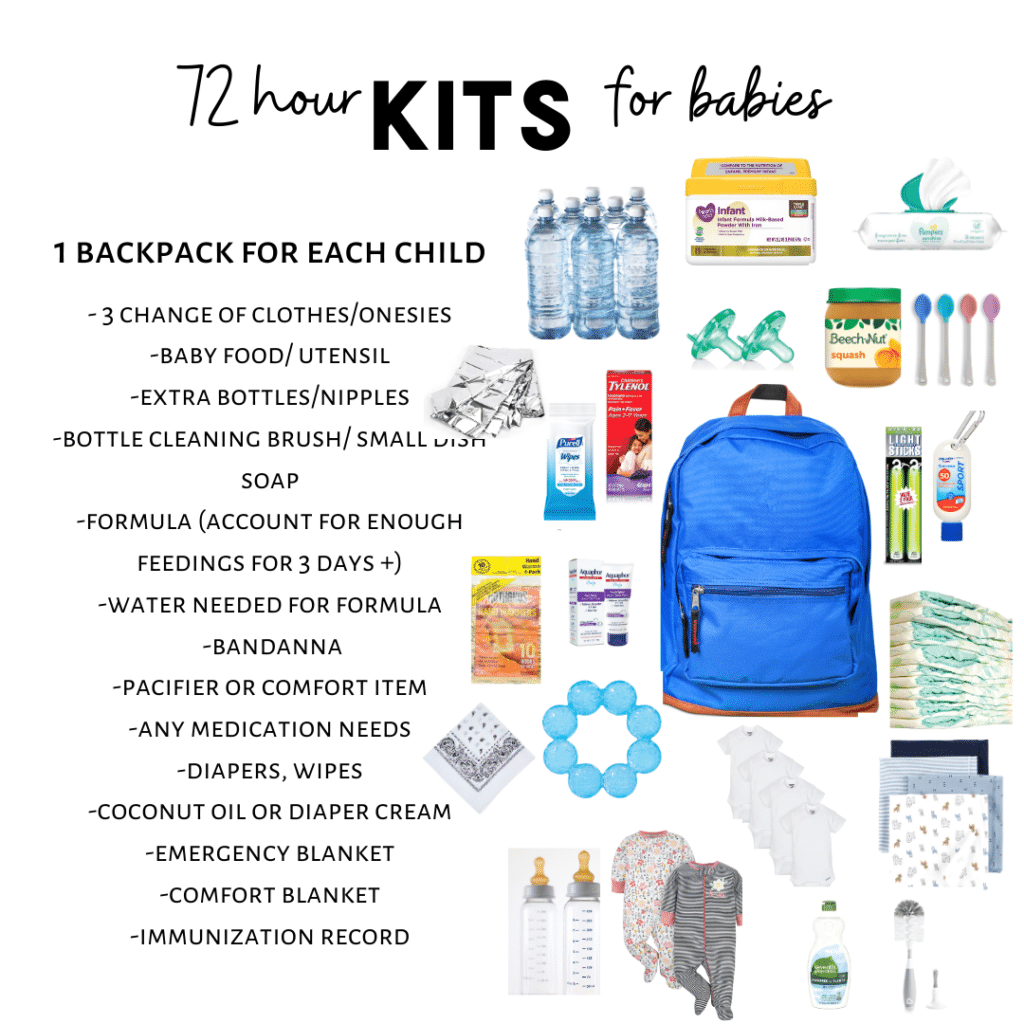
72 Hour Backpack Ideas For Pets:
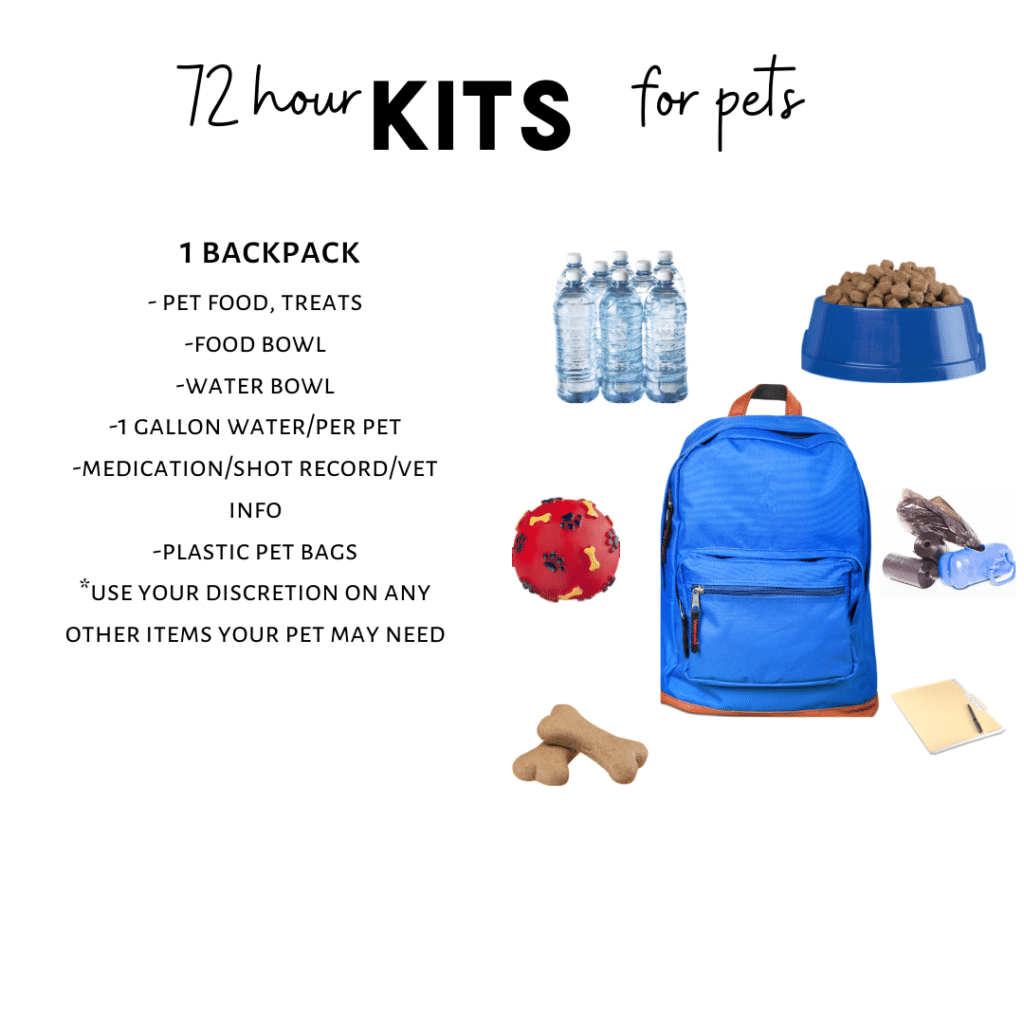
72 Hour Emergency Car Kit:
It is also important to consider having an emergency kit in your car. You can grab one like this and customize it by adding items you may need or check the list below for some general ideas.
Car kits are meant for an emergency situation that may take place while you are traveling in your vehicle. The car kits should include not only food and water for 72 hours, but necessary clothing for different weather, medication and first aid, and car tools that can help you if your car breaks down.
You can keep all these items in a large plastic bin in your trunk for easy access. Make sure you go through these items regularly to account for different seasons and growing children.
There have been countless situations where a good car kit can come in handy and it’s saved many lives especially in inclement weather situations.
Check out the inventory checklist below and the ideas page for more items that can be added to your car kit. Remember each family members’ car should have their own car kit.
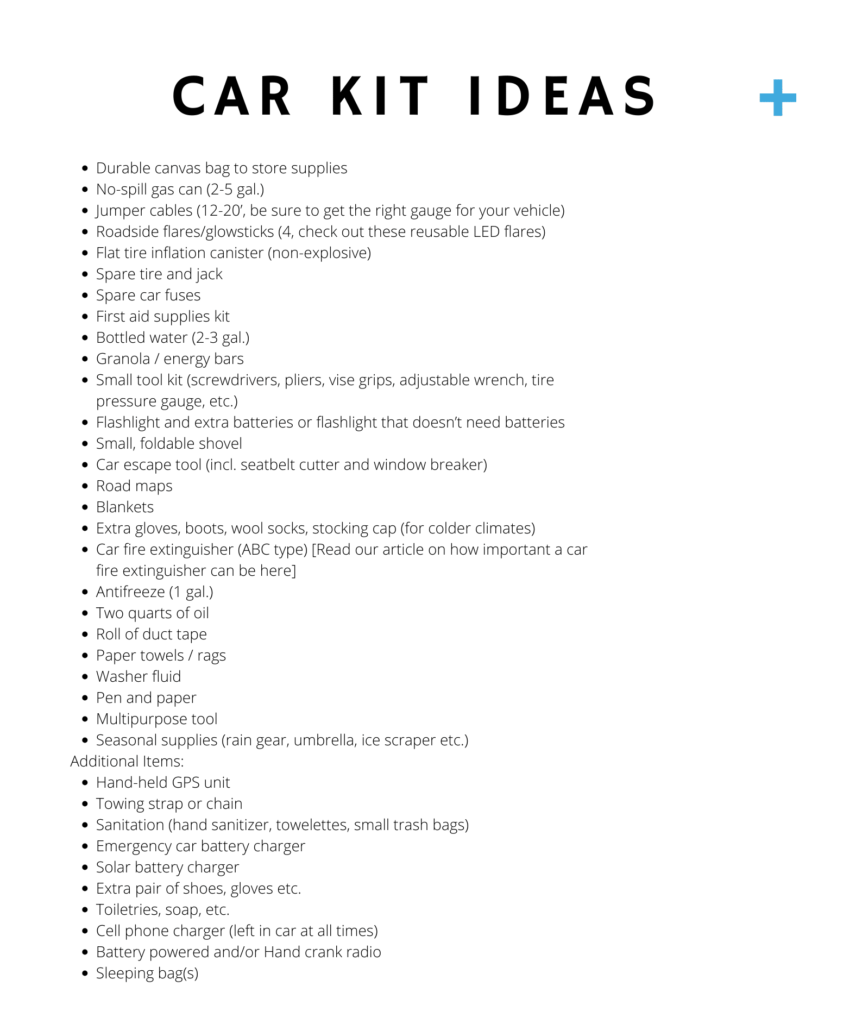
A 72-hour emergency backpack is a practical and proactive approach to preparedness in the face of unforeseen circumstances. Regularly review and update the contents of your kit to ensure that it aligns with the specific needs of your family and any changing circumstances.
By investing the time and effort to assemble a well-thought-out emergency kit, you empower yourself and your loved ones to face challenges with resilience and readiness, providing peace of mind in uncertain times.

